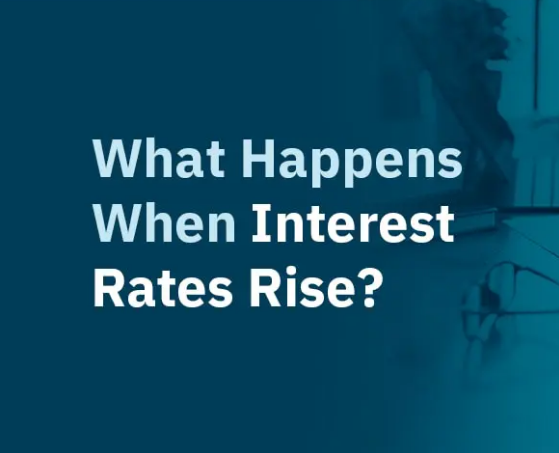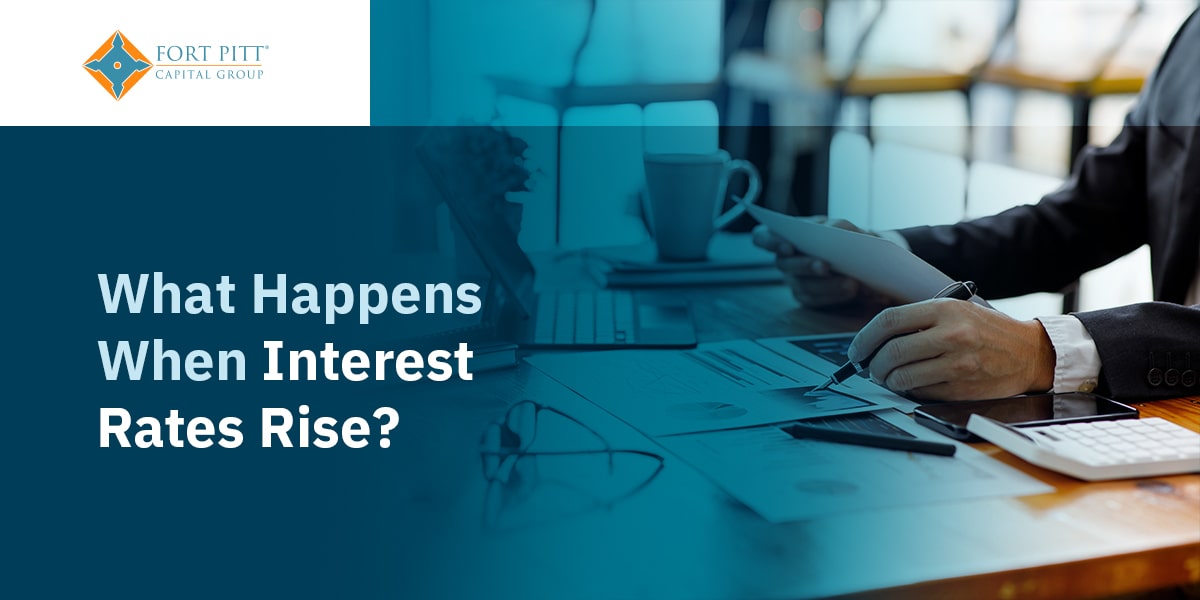What Happens When Interest Rates Rise?


More significant economic trends also impact interest rates. The COVID-19 pandemic is a recent example. At the beginning of the pandemic, the Federal Reserve (Fed) cut its rates to zero. Interest rates fell to record lows. In 2022, the Fed announced it would start increasing rates in response to high inflation levels. As a result, rates began to creep upward.
Rising interest rates offer good news and not-so-good news for investors. Learn more about what you can expect when interest rates increase.
What Do Rising Interest Rates Mean?
Rising interest rates have a direct effect on your ability to access credit. However, higher interest rates also mean you’ll see a better return on your savings.
The Fed controls interest rates by controlling the funding rate, which banks charge each other. When the Fed raises its funding rate, it triggers a chain reaction. Banks increase the interest they charge on most types of loans. Potential borrowers become more hesitant to borrow money because of the higher cost. People buy less, reducing demand for products and potentially reducing inflation.
Banks often tighten credit standards when they increase rates, further reducing the number of loans they make.
Rising interest rates also make it more challenging for businesses to borrow money. Instead of getting a loan to purchase new equipment, a company might cut its production level. Reduced productivity means fewer goods on the market. It can also mean the business needs fewer employees.
What Happens When Interest Rates Rise
From employment to productivity levels, rising interest rates have far-reaching effects. Take a closer look at what higher rates mean for your ability to borrow, save, invest or spend money.
1. How Rising Interest Rates Affect Spending
Higher interest rates affect spending in a couple of ways. First, the cost of borrowing money goes up. Consumers will likely see higher interest rates on credit cards, auto loans, and personal loans.
People typically spend less when rates are high. Over time, reduced spending contributes to a significant drop in demand for goods. Companies often respond by lowering product prices, pushing inflation down.
2. How Rising Interest Rates Affect Saving
Rising rates tend to be good news for saving money. The interest rate savings accounts, money market accounts, and certificates of deposit (CD) earn go up when rates rise. As a result, savers get a greater return on the money they deposit into bank accounts or CDs.
Higher rates on CDs and savings accounts should encourage more people to save. One thing worth paying attention to is the actual rate an account or CD earns and how the rate compares to inflation. Savings rates have been so low recently that they aren’t keeping up with inflation even as they increase. That means you’ll get a better return now than before, but it still might not be enough to keep up with the cost of living increases.
3. How Rising Interest Rates Affect Inflation
When the Fed increases interest rates, it wants to push inflation down. Inflation usually averages about 3% annually. However, between March 2021 and 2022, prices rose 8.5%, nearly three times the average rate. The dramatic rise in inflation caused the Fed to boost rates.
The Fed has increased rates several times to manage inflation. In the early 1980s, inflation was a staggering 14%. The Fed boosted interest to 19%.
Its actions had both positive and negative effects. Raising the interest rates drew inflation to a halt. It also sent the economy into a deep recession.
4. How Rising Interest Rates Affect Stocks
The stock market typically sees an immediate reaction to higher interest rates. Usually, higher interest rates mean more volatility in the stock market.
Since borrowing costs more, businesses can have difficulty raising capital when rates are up. They also need to charge more on any bonds they issue, making it difficult to attract funding. Companies might reduce their growth projections or otherwise tighten their belts. Their actions can cause their stock price to dip, reducing overall market prices.
Higher interest rates can also make investors more likely to sell their stocks, which affects the market overall. The more people sell, the lower stock prices dip. Falling stock prices often cause people to panic-sell, pushing prices down even further.
5. How Rising Interest Rates Affect Bonds
Bonds are the lower-risk cousins of stocks. When investors turn away from investing in stocks, they focus on investing in bonds.
Interest rates affect bond prices and the return on bonds. Usually, the price of bonds falls when rates rise. The bond’s rate of return goes up, making them a more desirable asset for investors.
6. How Rising Interest Rates Affect Real Estate
Mortgage interest rates don’t follow the Fed’s funding rate. But that doesn’t mean rising interest doesn’t affect the rates on home loans or other real estate loans. Mortgages typically follow the 10-year Treasury Yield. The Treasury Yield has recently gone up, pushing mortgage interest rates higher.
After hovering at record lows in 2021, mortgage interest rates jumped by 2% in early 2022. The sudden rise in mortgage rates and an above-average increase in housing prices are likely to cause a market slowdown. It’s more expensive to borrow money for a new home, and many homebuyers feel priced out of the market. Fewer people are likely to buy when the cost is too high.
What Should You Do During a Period of Rising Interest Rates?
Any change in interest rates creates an opportunity to review your portfolio. It might also be worthwhile to refinance certain loans to lock in a rate before they increase substantially. The exact steps you take depend on where you are in life and your financial goals. A wealth manager can help you make the moves that are most likely to pay off in the long run.
Some possible steps to take include:
- Refinancing an adjustable-rate loan: Refinancing to a fixed-rate loan before rates climb can be a good option if you have an adjustable-rate mortgage.
- Creating a bond ladder: With a bond ladder, you purchase bonds that mature at different times, such as six-month and 12-month. As each bond matures, you can reinvest it in a new one that should have a higher interest rate.
- Reconsidering inflation hedges: You might consider cutting back on gold and other metals investments when rates are high since the higher rates usually push inflation down.
Learn More About Our Financial Advisory Services
The market is constantly changing, but the financial advice you receive should be constant and steady. Fort Pitt Capital Group offers financial advisory services that put your best interests first. As rates increase and you reconsider your portfolio, we can help you make the decisions that allow you to reach your goals. Contact us today to learn more.



